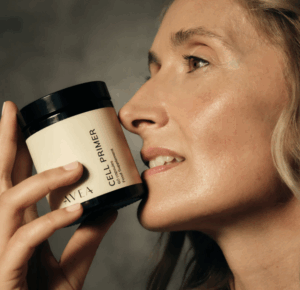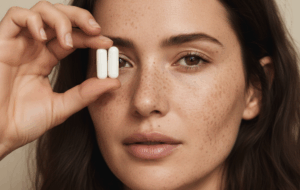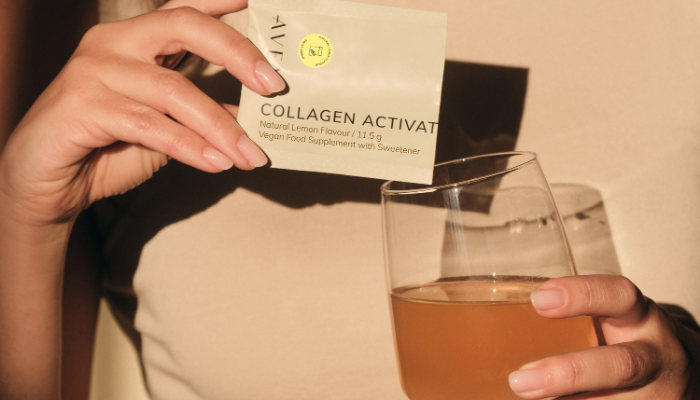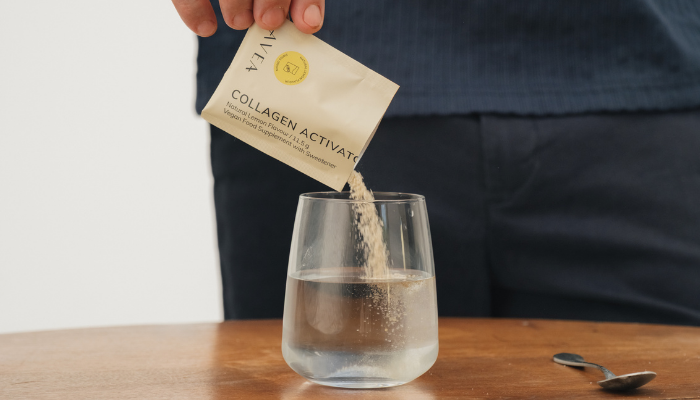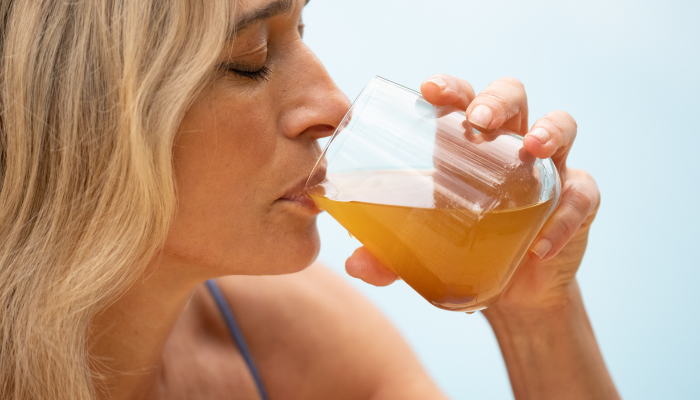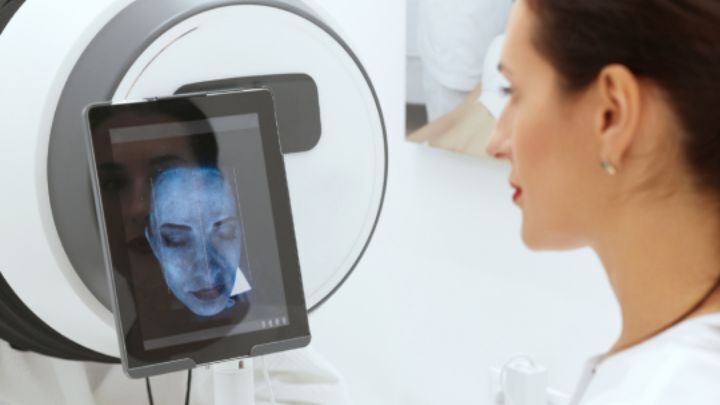Have you tried every serum, every mask, every “anti-ageing” routine – and your skin still feels dry and looks tired? You’re not alone.
Even the most advanced skincare can fall short when it comes to dryness, sensitivity, or visible signs of ageing.
Because the real problem often isn’t on the surface: As we age, our skin loses key structural components – deep within the skin barrier. To truly restore hydration, resilience and a more youthful glow, support needs to come from within.
For years, collagen was considered the gold standard in anti-ageing skincare. But like all areas of science, skin research constantly evolves. Today, new insights are reshaping the way we think about hydration, resilience, and how to truly care for ageing skin.
Keep reading to discover the missing link in your routine – and why collagen alone is not enough to truly make a difference.
In this article
Serums and creams can’t address deeper skin concerns
When people are unhappy with their skin, they often reach for the next serum on the market. One product follows another, always with the hope that this one will finally make a difference. But if nothing ever seems to work well enough, it may be time to consider a different approach: supporting your skin from the inside.
Most skincare products only act on the surface of the skin. They can soothe, hydrate, or protect temporarily, but they can’t replenish the deeper biological components your skin loses over time – like hyaluronic acid, ceramides, and collagen.
Therefore, topical solutions can offer temporary relief, but they don’t address the root of the problem. It’s like trying to pour water into a cracked vase – the water just leaks right out.
To truly repair, renew, and protect the skin long-term, you need to restore it from the inside: rebuilding structural integrity, enhancing cellular renewal, and strengthening the skin barrier at its core.
That’s where smart, science-based skin supplements come in. The right formula can deliver hydration from within, rebuild the barrier to maintain moisture, and support skin regeneration and protection. Together, they help your skin do what no topical can: stay strong, resilient, and radiant from the inside out.

Why collagen replenishment is not enough for smoother, firmer skin
Collagen has become the go-to hero in the anti-ageing conversation – and for good reason. From your mid-20s onward, collagen levels decline by roughly 1% per year, thus affecting skin firmness, elasticity, and structure. As the structural protein that gives skin its firmness and resilience, a decline in collagen is closely linked to visible signs of ageing. But while replenishing collagen is helpful, it’s just one part of the solution.
Focusing only on collagen overlooks the complex, multi-layered changes that ageing skin undergoes long before fine lines appear.
Here’s what’s really happening beneath the surface of ageing skin:
1. Your Skin Barrier Weakens
Before collagen loss becomes visible, the skin’s outer barrier starts to weaken. This makes it harder to retain moisture and defend against everyday stressors like UV rays, pollution, and temperature extremes. The skin becomes dry, irritated, and increasingly sensitive.
2. Hyaluronic Acid Production Declines
As we age, natural levels of hyaluronic acid, a molecule that binds and retains moisture in the skin, begin to decline. This leads to a noticeable loss of hydration, firmness, and glow. Without sufficient moisture, your skin appears dull and fine lines become more visible – even if collagen levels are being supported.
3. Cell Turnover Slows Down
In youthful skin, the process of cell renewal, where old skin cells are shed and replaced by new ones, takes about 28 days. This natural turnover keeps the skin smooth, radiant, and healthy. But as we age, this cycle slows dramatically to beyond 80 days. When cell turnover slows down, the skin struggles to repair itself efficiently. Dead skin cells build up on the surface, making skin appear uneven. This also creates a barrier that reduces the effectiveness of your skincare products because active ingredients have a harder time reaching the deeper layers where they’re needed most.
4. Oxidative Stress Increases
Free radicals, triggered by sun exposure, pollution, and internal stress, begin to damage not just collagen and elastin, but also skin cell membranes. Over time, this weakens the skin’s ability to repair itself and stay firm, smooth, and resilient.
As we age, we don’t just lose collagen – the entire environment that supports it begins to change. If we don’t also care for that environment, including hydration levels, cell renewal, and especially the skin’s barrier, collagen alone won’t be enough to keep skin smooth, firm, and healthy over time.
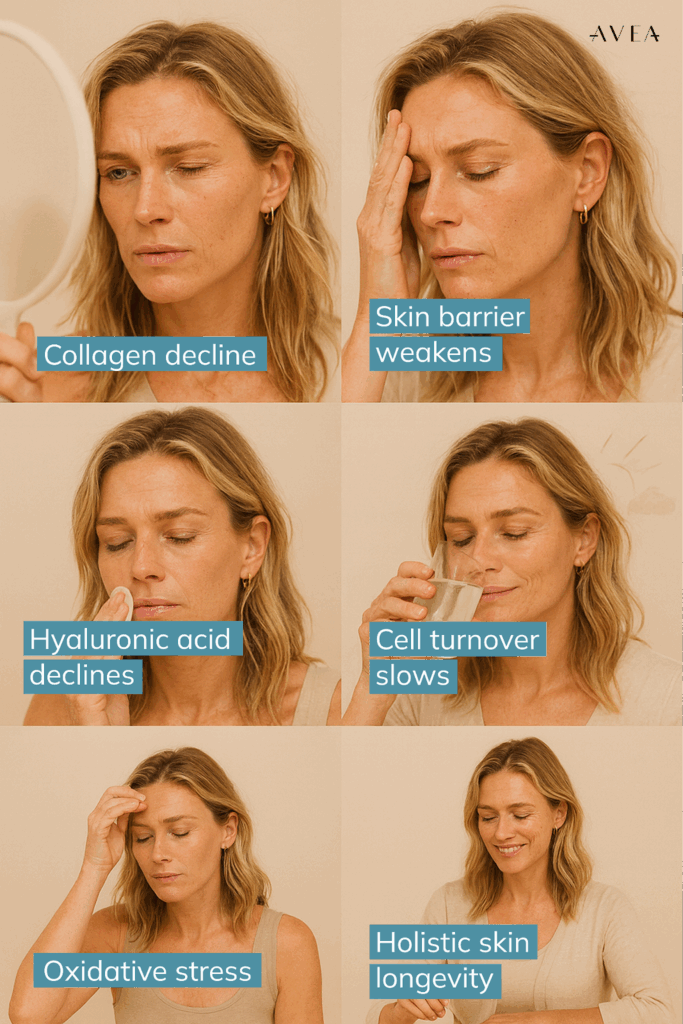
Why should you care about your skin barrier and what does it do for your skin?
The skin barrier is one of the most overlooked elements in skincare – yet it plays one of the most essential roles. This ultra-thin, invisible layer is responsible for almost every visible sign of healthy skin, from smoothness to firmness.
Made up of lipids, ceramides, and tightly packed skin cells, it quietly works around the clock to lock in moisture, keep irritants out, and support the skin’s natural ability to renew and protect itself.
Here’s what this invisible shield is constantly doing for you:
- Keeping moisture in: So your skin stays plump, hydrated, and comfortable
- Keeping irritants, bacteria, and pollutants out: Blocking the everyday stressors you don’t see but your skin feels
- Maintaining a smooth, supple texture and healthy glow: Because moisture + protection = radiance
- Supporting your skin’s microbiome and immunity: A healthy skin barrier nurtures a balanced environment for beneficial bacteria that protect you from inflammation and infection
Healthy, even and radiant skin is a reflection of a well-functioning barrier. But as time passes, this protective system gradually weakens.
How ageing weakens your skin structure
As we age, a series of biological shifts begin to take place – many of which quietly undermine the skin’s structure, strength, and ability to bounce back. These changes don’t just affect how your skin looks on the surface, but how well it functions from within.
- Reduced lipid and ceramide production: These are the “mortar” between skin cells, sealing in moisture. With age, your skin produces fewer of them, weakening the barrier and making it more porous.
- Decline in hyaluronic acid: Your skin’s natural water magnet decreases over time, leading to dryness and tightness.
- Collagen and elastin loss: These structural proteins break down faster than they’re replaced, making skin thinner, less elastic, and more prone to damage.
- Slower cell turnover: Skin cells don’t renew as quickly, so the outer layer builds up dead cells while the inner layers regenerate more slowly. This disrupts the skin’s ability to repair itself.
- Oxidative stress: Years of UV exposure and pollution cause skin inflammation and free radical damage that further break down the skin barrier over time. Specific cellular protectants can help counteract these effects.
Over time, even with a consistent skincare routine, your skin’s natural ability to renew itself begins to slow. At the same time, essential structural components – like hyaluronic acid, ceramides, and collagen – gradually decline, affecting hydration, firmness, and overall texture.
Hyaluronic acid alone can’t repair a weakened skin barrier
In the hope of making their skin appear younger and more resilient, many turn to hyaluronic acid supplements. Hyaluronic acid is beloved for a reason: it binds water to the skin, giving that instant plumping, dewy effect. Recent research shows that taking oral hyaluronic acid supplements can genuinely boost skin hydration from within¹.
What is hyaluronic acid?
Hyaluronic acid is a naturally occurring molecule in the human body, best known for its remarkable ability to bind and retain water – up to 1,000 times its own weight. It’s found in high concentrations in the skin, connective tissues, and joint fluid, where it plays a critical role in maintaining hydration, structural support, and lubrication. By keeping cells and tissues moist and resilient, hyaluronic acid contributes to healthy skin elasticity, joint mobility, and efficient wound healing.
As we age, the body’s natural production of hyaluronic acid decreases, which can lead to drier skin, fine lines, and joint stiffness. This is why it’s commonly included in skincare formulas, dietary supplements, and medical treatments – to help restore moisture levels, support skin plumpness, and ease joint discomfort.
In skincare, hyaluronic acid is celebrated for helping skin look plumper and smoother. Clinical studies demonstrate that oral HA improves skin moisture, enhances elasticity, and reduces wrinkle depth over time.¹ It works by increasing HA levels in deeper layers of the skin, supporting long-term hydration and barrier integrity from within – something topical treatments alone cannot achieve.
In the body, hyaluronic acid plays a vital role in joint lubrication by acting as a cushion and lubricant within the synovial fluid—the thick fluid that helps joints move smoothly and without friction. It also supports wound healing by regulating inflammation, promoting tissue repair, and facilitating the migration of skin cells to the site of injury.
However, when a supplement contains only one active ingredient, like hyaluronic acid, it misses the bigger picture: skin health is complex and requires more than just hydration.
Why hyaluronic acid is not enough
Just like a cracked vase can’t hold water, skin without a strong barrier can’t retain moisture – no matter how much hyaluronic acid you add. Hydration may reach the surface, but it doesn’t stay where it’s needed. The result is temporary hydration at best, followed by the same dryness and lack of firmness returning once the effect fades.
That’s why one ingredient has been gaining popularity in skincare: ceramides.
Ceramides are naturally occurring lipids in the outermost layer of the skin. They help form the structure of the skin barrier, acting like mortar between skin cells, sealing in moisture and shielding against external stressors.
In combination with ceramides, hyaluronic acid becomes significantly more effective. But your skin needs even more.
To truly keep skin healthy and resilient over time, it also requires deep, ongoing support for renewal and regeneration – driven by antioxidants, cell-activating plant compounds, and essential nutrients that help maintain a healthy rate of cell turnover.
A single hyaluronic acid capsule, no matter how advanced or expensive, can’t meet all these needs. Real skin transformation requires a complete formula that hydrates, rebuilds, and renews.
How to choose the right skin supplement for hydration, repair and renewal
With so many beauty supplements on the market, it’s easy to be drawn in by trendy ingredients or vague promises of “glow.” Here’s what to look for in a powerful skin support formula:
1. Clinically studied ingredients
Not just “hyaluronic acid” or “ceramides” – but specific, research-backed forms shown in human trials to improve hydration, skin elasticity, or barrier repair. Examples include Ceramosides™ (plant-based ceramides) or hyaluronic acid at clinically effective doses (~120–240 mg daily).
2. Synergistic nutrients that promote collagen formation, strengthen the barrier, and support cell turnover
Look for a complete matrix: antioxidants (like Vitamin C) that protect collagen, ceramides that reinforce the lipid matrix, niacinamide to support the skin barrier, and longevity activators (like DracoBelle™ or PhytoCellTec®) to enhance skin renewal from within.
3. Bioavailable forms of essential vitamins and minerals
Focus on well-absorbed, active forms, like niacinamide (not just generic B3), bioactive Vitamin C (ascorbic acid or natural extracts like acerola), and copper in chelated forms that effectively support enzymatic skin repair and collagen production
4. Transparent sourcing and double-tested purity
Brands should disclose ingredient origins (e.g., European-sourced, fermented HA, natural plant extracts) and conduct third-party purity testing to verify absence of contaminants, allergens, and ensure potency.
5. A holistic formula targeting hydration, elasticity, barrier resilience, and skin longevity
The best supplements don’t just “moisturise” – they rebuild structural integrity, reduce oxidative stress, and enhance the skin’s regenerative capacity over time. Look for formulas that work on hydration, firmness, repair, and resilience together.
When you prioritise science-backed ingredients, advanced formulations and full transparency, you give your skin the support it needs to stay radiant, strong, and beautifully resilient at every age.
How SkinSpan™ works – and why it’s so different

SkinSpan™ was created to address the areas that simple collagen supplementation leaves out. While most beauty supplements promise glow and radiance, they rarely target the deeper biological drivers of skin ageing – like barrier breakdown, declining hydration, and slowed cell renewal. So we partnered with leading longevity researchers to design a formula that goes deeper, targeting the biological processes behind hydration, renewal, and resilience.
SkinSpan™ combines clinically studied ingredients at meaningful doses to support your skin from within:
- Hyaluronic Acid (200 mg): A moisture-binding molecule naturally found in the skin, this high-potency dose improves hydration, elasticity, and skin volume – helping to plump and smooth from the inside out.
- Ceramosides™ (30 mg): A patented, plant-based ceramide complex derived from non-GMO wheat lipids; clinically shown to restore skin hydration, repair the barrier, and reduce wrinkles² – enhancing skin quality in only 14 days³.
- PhytoCellTec® Md Nu (10 mg): A rare stem cell extract from the Swiss Uttwiler Spätlauber apple, known for its extraordinary longevity. This patented ingredient supports skin stem cell vitality and boosts cellular renewal for fresher, more resilient skin⁴.
- DracoBelle™ Nu (200 mg): DracoBelle™ Nu sd is a standardized dry extract from the plant Dracocephalum moldavica L. In cell studies, it significantly activated the longevity pathways AMPK and FOXO1. In a clinical trial with daily intake (200 mg over 84 days), the following skin effects were observed: +71.1 % mehr Hautfeuchtigkeit und +8,7 % Zunahme der Dermisdicke⁵.
- Vitamins and minerals: A targeted blend of vitamins and minerals – including Vitamin C, Niacinamide (B3), Riboflavin (B2), Biotin (B7), Vitamin A (as beta-carotene), and Copper – supports collagen formation, antioxidant protection, and skin barrier function.
SkinSpan™ isn’t just another beauty supplement. It’s a comprehensive skin longevity formula – designed to nourish, protect, and renew your skin on a cellular level.
Lasting hydration and radiance starts from within
If your skincare routine still leaves you chasing hydration, it’s not because you’re missing another serum – it’s because true skin resilience has to be built from the inside out.
Healthy skin isn’t just hydrated. It’s protected, renewed, and able to withstand stress.
That’s why SkinSpan™ goes beyond surface fixes – working at the cellular level to rebuild the skin’s natural barrier, restore hydration reserves, protect collagen integrity, and activate the internal renewal pathways that fade with age.
By combining clinically studied hyaluronic acid, plant-based ceramides, antioxidant defence, and stem cell protection, SkinSpan™ doesn’t just help your skin look better – it helps it stay stronger and age slower.
Because real radiance isn’t what you layer on top – it’s what your skin is built to hold on to, every single day.
What’s the difference between our SkinSpan™ and Collagen Activator?
While our Collagen Activator focuses on stimulating collagen production, SkinSpan™ is designed to preserve and protect the environment that collagen depends on – including hydration, barrier strength, and cellular renewal.
The Collagen Activator is designed to stimulate new collagen production directly at the source using Colgevity™ – a patented, 100% vegan complex clinically shown to be up to 4x more effective than standard peptides.
It provides the exact amino acids and essential cofactors (like Vitamin C and L-Lysine) your body needs to activate fibroblasts – which are the skin cells responsible for generating new collagen.
Our SkinSpan™ supports the skin barrier, replenishes lost hydration, and enhances cellular renewal, which are all critical factors that determine how long collagen lasts, how well your skin functions, and how youthful it looks.
SkinSpan™ also contains targeted antioxidants and plant-based actives that help protect collagen from oxidative stress, UV exposure, and environmental damage – key drivers of premature collagen breakdown.
We recommend using both formulas together, as they complement each other to create the ideal environment for long-term skin health.
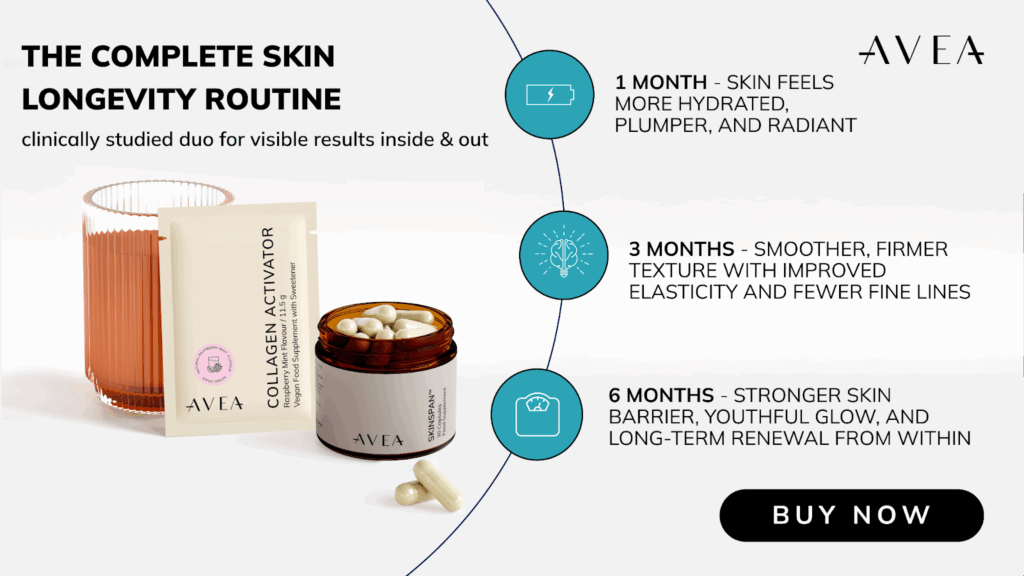
References
¹Hsu TF, Su ZR, Hsieh YH, et al. Oral Hyaluronan Relieves Wrinkles and Improves Dry Skin: A 12-Week Double-Blinded, Placebo-Controlled Study. Nutrients. 2021;13(7):2220. Published 2021 Jun 28. doi:10.3390/nu13072220
²Bizot V, Cestone E, Michelotti A, Nobile V. Improving Skin Hydration and Age-related Symptoms by Oral Administration of Wheat Glucosylceramides and Digalactosyl Diglycerides: A Human Clinical Study. Cosmetics. 2017; 4(4):37. https://doi.org/10.3390/cosmetics4040037
³Kern C, Dudonné S, Garcia C. Dietary supplementation with a wheat polar lipid complex improves skin conditions in women with dry skin and mild-to-moderate skin aging. J Cosmet Dermatol. 2024;23(4):1320-1330. doi:10.1111/jocd.16130
⁴Baumann, J., Wandrey, F., Nowak, K., & Grothe, T. (2024). Nutritional supplementation of an apple callus extract to target epidermal aging. Journal of Food, Nutrition and Diet Science, 2(1), 18–28. https://doi.org/10.55976/fnds.22024123718-28
⁵Baumann J, Bönzli E, Wandrey F, Grothe T. Moldavian dragonhead extract: a natural collagen-booster to target skin aging. OBM Geriatrics. 2025;9(2):doi:10.21926/obm.geriatr.2502305


